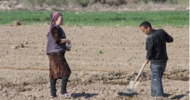The most recent U.N. demographic projections show world population growing to 9.3 billion by 2050, an addition of 2.3 billion people. Most people think these demographic projections, like most of those made over the last half-century, will in fact materialize. But this is unlikely, given the difficulties in expanding the food supply, such as those posed by spreading water shortages and global warming. We are fast outgrowing the earth’s capacity to sustain our increasing numbers.
A visit to Mozambique dispels any notion that big business is going to ‘feed Africa’. Hazel Healy reports on a land rush in full swing.
- New Internationalist
-
06 May 2013
Foreign investment in African land has been greatly fostered by the Indian Government and its business associations.
- Hindu Business Line
-
06 May 2013
Africa’s primary food security systems are at threat from the process of relentless land degradation, dispossession, privatisation and large scale land grabs.
Commerce and Industry Minister Tawfiq Al-Rabiah has approved the establishment of a new East Asia Agricultural Development and Investment Company to invest in farming.
Authorities have attributed the growth of a saline lake to irrigation runoff, including that from a company bought this year from the government by Horizon Plantations, a venture majority owned by Mohamed al- Amoudi, the largest single investor in Ethiopia.
Ethiopians stormed the 17th Street Office complex of the World Bank in Washington DC, protesting the bank’s alleged support for land grab and ethnic cleansing by President Girma Wolde-Giorgis
- Daily Independent
-
23 April 2013
With the large and sometimes overexposed attention for land grabbing in Africa, good examples tend to be forgotten
- The Water Channel
-
23 April 2013
Karuturi Global Limited, société holding de droit indien et dont le siège est situé à Bangalore, peut se retrouver sous la loupe de l'administration fiscale du Kenya pour fraude fiscale, mais les plaintes déposées contre elle vont plus loin.
The Kenyan government has found Karuturi Global Ltd, the world's biggest producer of cut roses, guilty of tax evasion. This is the first time an African government has brought a large multinational company to court for transfer mispricing through a fully public process.
Background note to accompany a joint press release on the Kenyan government finding Karuturi Global Ltd guilty of tax evasion
Ethiopian prime minister Hailemariam Dessalegn has denied that the government is forcing tens of thousands of people off their land in order to lease it to foreign investors.
- Sudan Tribune
-
21 April 2013
The following is a statement from the Oromo Studies Association (OSA).
When the Ethiopian government completes the Gibe III dam on the upper Omo, as it is expected to do shortly, large-scale irrigation will follow, allowing government sugar plantations to gobble up huge swathes of their ancestral land.
- Africa Review
-
17 April 2013
A new report by European Coordination Via Campesina and Hands off the Land network shows that land grabbing and access to land are a critical issues today in Europe.
Small-scale women farmers are the backbone of Africa's food system, but, as corporations buy up huge swathes of rural land, they are losing out at every turn. Marc Wegerif introduces a new Oxfam briefing paper.
Horizon Plantations, an emerging agro-specialized business owned by Sheikh Mohammed Hussein al-Amoudi, plans to compete with world’s leading banana producers following acquisition of several state enterprises.
- Capital Ethiopia
-
09 April 2013
Sai Ramakrishna Karuturi feels a growing sense of unease these days. It stems from an email that Karuturi received on March 7. The sender wrote he had lost Rs 7 lakh by investing in Karuturi Global Ltd's shares.
- Business Today
-
09 April 2013
Ram Karuturi mulls taking his rose-to-maize company private as its stock shows no signs of bouncing back.
- Business Today
-
08 April 2013
Farms were bought from govt for 1.1b birr ($59.4m), General Manager of Horizon Plantations Ethiopia Jemal Ahmed tells reporters in Ethiopia’s capital, Addis Ababa.
The 612 Indians on the list of those who have invested in tax havens such as the British Virgin Islands include two MPs, a former royal, top industrialists and the CEO of Karuturi Global.
"The UAE is looking not just at land [acquisitions] but developing the whole supply chain," says Nicholas Lodge, managing partner at Clarity, a consultancy that advises on investments in agricultural industries.
BRICS states, except Russia, are enhancing and facilitating land grabs abroad in a way that is inconsistent with their proclamations of sustainable development, cooperation solidarity, and respect of national sovereignty.
In its 2012 Annual Report, Louis Dreyfus Commodities says it owns and operates a total of more than 180,000 hectares of farming land distributed around the world, and that it is looking into more farming opportunities in the Ivory Coast, Cameroon and Tanzania.
Karuturi said it will borrow "hundreds of millions" of dollars from a sovereign wealth fund to invest in farming in East Africa after development banks declined to provide assistance because of “unfair” criticism by advocacy groups
This roundtable on conflict sensitive water and land management assembled representatives of Swiss civil society and state agencies to debate the implications of land acquisition on their work as well as their responses.
Reading between the lines, the Durban BRICS resolutions will support favoured corporations' extraction and land-grab strategies and confirm the financing of both African land-grabbing and the extension of neo-colonial infrastructure through a new 'BRICS Bank'
Bank's accountability panel says complaints by Ethiopians of forced evictions in Gambella should be looked into.
All this talk about people being displaced for the purpose of land lease is unfounded at best and even deliberately contrived at worst, says Minister Counsellor at the Embassy of Ethiopia in New Delhi
- Ethiopian Herald
-
19 Mar 2013
The G8 countries are implementing a New Alliance for Food Security and Nutrition in six African countries that will facilitate the transfer of control over African agriculture from peasants to foreign agribusiness.
















